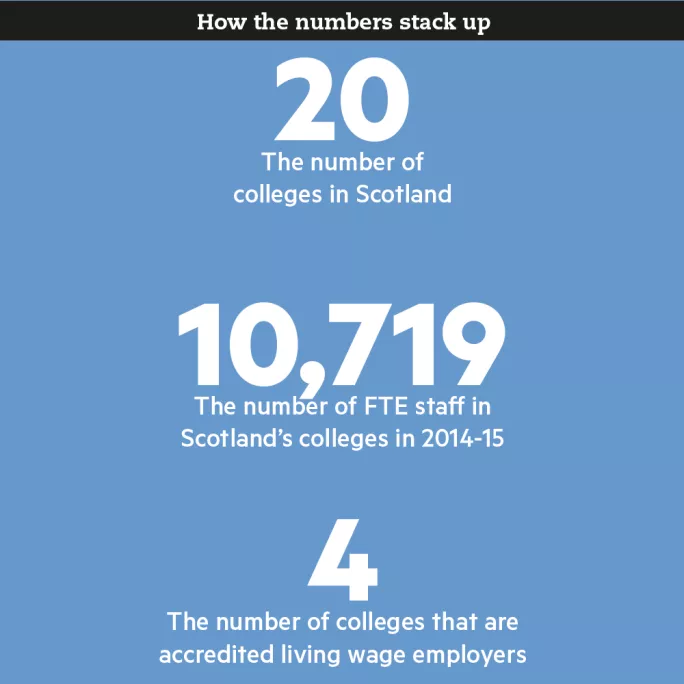Staff not guaranteed living wage in majority of colleges

Only one in five Scottish colleges officially guarantees all employees the living wage, TESS can reveal.
Information exclusively obtained from Colleges Scotland shows that only four colleges - Perth, North Highland, Forth Valley and Sabhal Mòr Ostaig - currently hold the accredited living wage status, despite the government expectation that all colleges do so.
And while some other colleges pay all staff the living wage but are yet to achieve accreditation, for others the cost associated with lifting all salaries to that level is seen as a barrier at a time when finances in further education remain tight.
In a number of cases, our analysis showed, it was only staff employed by outside contractors who were earning below the threshold.
‘We are working towards securing living wage accreditation for all colleges’
In response to the TESS survey, North East Scotland College said that becoming an accredited living wage employer would increase the cost of its contracted services by an estimated £100,000 per year. “Given our current financial situation, becoming an accredited living wage employer is not viable,” it said.
However, it had been agreed that the college’s board should “aspire to ensure that the living wage is implemented at a time when this would not impact on the quality of service or sustainability of the organisation”.
Glasgow Kelvin College, meanwhile, said in its response that if its contractors were to seek accreditation under the living wage employer conditions, costs would be passed on, through the contract, to the college. “This cost is currently circa £100,000 on an annually recurring basis. The college will not receive any additional resource to meet these costs and would be required to reduce costs further in other areas,” the college said.
And Dundee and Angus College said in its response, after settling a national dispute with support staff last year, that the current minimum hourly rate was now above the living wage level. “We have a small number of casual staff that are paid at minimum wage level so there will be a small cost associated with bringing these up to living wage,” it said.

Financial challenges
In its latest report on Scotland’s colleges, published in August, Audit Scotland said that the overall financial health of the sector was relatively stable, although there were a number of colleges with underlying financial challenges.
Shona Struthers, chief executive of the Colleges Scotland Employers’ Association, which represents college management in the sector’s national bargaining negotiations, said: “As part of our 2015-16 pay agreement for support staff, we are committed to the living wage and are working towards securing living wage accreditation for all colleges. Progress on this commitment has been limited due to delays to the settlement of the 2016-17 pay agreement.
“However, we are now in a position to work in partnership with the trade unions to take forward all of the agreed commitments as per the 2015-16 pay agreement, and we are keen to move on towards jointly developing a workforce for the future.”
Unison, which represents college support staff, said FE employers had agreed in the 2015 pay deal, that all constituent colleges should achieve living wage accreditation by December 2016, but this had not been properly implemented. A spokesman said: “Unison will not rest until every worker in the sector is in scope of the National Joint Negotiating Committee and benefits directly or indirectly from its agreements.” All outsourced staff in NHS Scotland were on identical terms and conditions as directly employed staff, he added.
He said Unison would continue to campaign to bring privatised contracts back in house and that privatisation was “a failed policy in terms of quality public services”.
And a spokeswoman for the EIS teaching union said it supported colleges paying the living wage and being accredited living wage employers. She added: “The EIS has worked with Unison to promote this issue in the national bargaining process. It is disappointing to note that many have not become so, and symptomatic of their tardy and frustrating approach to national pay issues.”
Last autumn, First Minister Nicola Sturgeon announced a rise in the national living wage to £8.45 per hour. A Scottish government spokesman said: “We are disappointed that more progress has not been made by institutions to obtain accreditation.”
“Ministers have been clear that public bodies should lead the way on Fair Work, ensuring access to good jobs, providing security and opportunity to employees, treating them with respect and providing fair reward.
He said colleges were “vital to Scotland’s success”. “That is why this government has invested significantly in the sector, with £530 million of funding provided to colleges this year,” he added.
You need a Tes subscription to read this article
Subscribe now to read this article and get other subscriber-only content:
- Unlimited access to all Tes magazine content
- Exclusive subscriber-only stories
- Award-winning email newsletters
Already a subscriber? Log in
You need a subscription to read this article
Subscribe now to read this article and get other subscriber-only content, including:
- Unlimited access to all Tes magazine content
- Exclusive subscriber-only stories
- Award-winning email newsletters